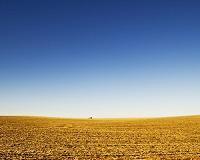 |
San Antonio (UPI) Mar 3, 2011 The U.S. government's approval of genetically modified alfalfa is generating controversy in Texas, with organic farmers saying it will contaminate their crops. Cameron Molberg at the Coyote Creek Organic Feed Mill outside Austin compares genetically modified alfalfa to a plague. Its spreading use means pollen blown in or carried from the bio-engineered alfalfa could contaminate organic alfalfa fields, forcing feed mills like his and organic dairies to find other feed stock to keep going, he says. "The small, independent dairies reliant on organic alfalfa will be out of business," he told the San Antonio Express News. "There's really no way to stop it." In late January, the U.S. Department of Agriculture approved the planting of the altered alfalfa, genetically modified to withstand the effects of the weed killer Roundup, after nearly four years of litigation. The National Alfalfa and Forage Alliance endorsed the USDA decision, saying growers need access to the newest technological advances to remain competitive. But the alliance acknowledges that organic farming has become one of the fastest-growing sectors in agriculture, and organic alfalfa is an important component of that sector. Beth Nelson, the alliance's president, said organic alfalfa producers have expressed concerns about the possibility that genetically modified alfalfa would overrun organic and conventionally grown alfalfa, destroying their value. Appropriate harvesting standards for the different types of alfalfa should resolve the issues, Nelson said, and allow different types of growers to survive However, George Kimbrell, senior attorney for the Center for Food Safety, said officials cannot guarantee that cross-contamination can be prevented and said the center plans to sue the USDA to try to reverse its decision.
Share This Article With Planet Earth
Related Links Farming Today - Suppliers and Technology
 Sustaining The Biodiversity Of The Western Great Plains
Sustaining The Biodiversity Of The Western Great PlainsBoulder CO (SPX) Mar 03, 2011 Fire, cattle and even prairie dogs all could play a role in sustaining the biodiversity of the western Great Plains, according to a U.S. Department of Agriculture (USDA) researcher. As large grazers, cattle now perform the historical role of buffalo on the Great Plains. Ecologist David Augustine and his colleagues-in collaboration with state, federal, and university researchers-have result ... read more |
|
| The content herein, unless otherwise known to be public domain, are Copyright 1995-2010 - SpaceDaily. AFP and UPI Wire Stories are copyright Agence France-Presse and United Press International. ESA Portal Reports are copyright European Space Agency. All NASA sourced material is public domain. Additional copyrights may apply in whole or part to other bona fide parties. Advertising does not imply endorsement,agreement or approval of any opinions, statements or information provided by SpaceDaily on any Web page published or hosted by SpaceDaily. Privacy Statement |